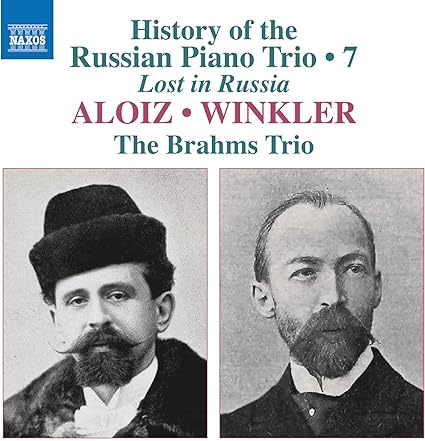

Vladislav Aloiz (1860-1918): Piano Trio in F major, Op. 40 (1894) Alexander Winkler (1865-1935): Piano Trio in F-sharp minor, Op. 17 (1910)
Not even two months have passed since the release of Volume 6 in this projected 15 volume series of recordings, and The Brahms Trio already offer us Volume 7 which features two world premiere recordings of chamber music works by relatively unknown composers.
Although not intrinsically Russian, these two composers worked in Russia along with many European artists making a living there. Vladislav Aloiz was a Czech cellist and composer. In 1893, he performed Tchaikovsky's Rococo Variations with an orchestra conducted by Tchaikovsky himself. He eventually landed a post as teacher in Russian conservatories. Alexander Winkler was born into an Austrian family in the city of Kharkiv in Ukraine. He performed as a pianist in Russia and eventually became a piano teacher at the St Petersburg Conservatory. They both lived and worked during the transition from the 19th to the 20th century, the most fecund and productive period in music history.
The eloquent Piano Trio in F major, Op. 40 by Vladislav Aloiz launches with a lyrically commanding melody borne by the cello, and leads to an emotionally charged first movement during which all three musicians get entangled into the music's stirring character. The work concludes with an Allegro giocoso which does full justice to its designation. Spirited, humorous and brimming with energy. Its highly rhytmic forward momentum leads to a boisterous ending that must have seemed innovative for its time.
On the other hand, the Piano Trio in F-sharp minor, Op. 17 by Alexander Winkler presents a more serene, almost Brahmsian demeanor. Harmonically rich rather than melodic, it requires a more intimate and group conscious effort from all three musicians which is well achieved here. Its Vivace second movement demands pinpoint accuracy, while its lush Andante third movement begs for dynamically expressive contours and phrasing, combined with a darker, more dramatic tone. And the members of the Brahms Trio deliver on all counts.
As mentioned earlier, these are world premiere recordings. So if you're a chamber music enthusiast looking to hear something new anchored in the rich romantic tradition, you can't really do much better than this.
Jean-Yves Duperron - July 2025 Alexander Winkler - Opening Movement